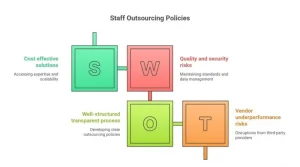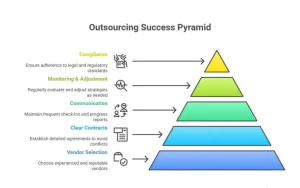For accessing specialized skills and improving operations, staff outsourcing is becoming very popular. Developing staff outsourcing policies leads to having a well-structured and transparent process.
In this article, we discuss staff outsourcing policies in detail. We also cover their benefits, challenges, and best practices.
What is Staff Outsourcing?
Staff outsourcing involves hiring external workers and outsourcing staffing company. They handle specific tasks and functions. This encompasses short-term assignments and long-term roles. Businesses often use this approach for specialized roles where expertise and flexibility are most important.
The right staffing outsourcing solutions help companies manage their workload. It’s a flexible and practical choice for many industries without hiring permanent employees.
Benefits of Staff Outsourcing
Outsourcing staff brings many advantages. This includes
- Cost Savings: It reduces the need for full-time salaries, benefits, and other associated expenses.
- Access to Expertise: When businesses partner with experienced professionals or firms, they gain access to skills that might not be available in-house.
- Scalability: Outsourcing allows companies to adjust their workforce according to their project requirements. There’s no need for long-term commitments.
- Focus on Core Activities: Companies can focus on their main operations. Meanwhile, outsourced teams manage other tasks.

Challenges of Staff Outsourcing
While staff outsourcing has its benefits. There are challenges that businesses must address, too.
- Quality Control: It can become quite difficult to make sure the outsourced team maintains the same standards as in-house employees.
- Cultural Difference: Communication and work culture may vary. This affects productivity and collaboration.
- Security Concerns: Sharing sensitive information with an external team requires careful data management.
- Dependence on External Partners: Relying heavily on third-party providers leads to disruptions if the vendor underperforms. Or if they discontinue their services.
Best Practices for Staff Outsourcing Policies
To make outsourcing successful, businesses should adopt best practices that maximize value and minimize risks. Here’s a summary:
- Choose Experienced Vendors: Collaborate with firms that have a proven track record in providing quality outsourcing staff services.
- Establish Clear Contracts: Detailed contracts help set clear expectations and avoid conflicts.
- Prioritize Communication: Frequent check-ins and progress reports ensure that both parties remain on the same page.
- Monitor and Adjust: Regular evaluations help identify areas for improvement and adjust strategies as needed.
- Adhere to Compliance Standards: Ensuring legal and regulatory compliance prevents potential issues and builds trust.
Case Studies and Examples
To understand the impact of staff outsourcing policies, we take a look at some case studies. These highlight successful initiatives and lessons learned.
Successful Staff Outsourcing Initiatives
1) A UAE-based IT company partnered with a specialized outsourcing firm to manage its tech support services. It implemented clear performance indicators and maintained open communication. This way, they enhanced customer satisfaction. Their operational costs were reduced significantly, too.
2) A retail business in Abu Dhabi outsourced its logistics operations. This led to a 30% improvement in delivery times and overall customer satisfaction. This success was attributed to the careful selection of a vendor aligned with the company’s goals and standards.
Lessons Learned from Outsourcing Failures
1) An international marketing firm faced issues when its outsourcing partner failed to meet deadlines. This was due to unclear contractual terms and insufficient monitoring. The lesson here is the importance of well-defined contracts and consistent evaluations.
2) A finance company experienced data breaches when partnering with an unvetted vendor. This incident highlights the importance of choosing reliable vendors and implementing strong data security protocols.

Key Components of Staff Outsourcing Policies
Developing staff outsourcing policies is necessary for managing relationships and outcomes. These are the main elements to consider.
Policy Goals and Objectives
Setting clear goals helps outline what the organization expects from the outsourcing arrangement. These objectives guide the policies. It ensures all parties understand their roles and responsibilities.
Scope of Outsourcing
Defining the scope ensures clarity on which functions or tasks are outsourced. Be it IT staff outsourcing services or administrative tasks, specifying the scope prevents misunderstandings. It also sets clear expectations.
Vendor Selection Criteria
Selecting the right partner is of the essence. Criteria includes
- Experience
- industry reputation
- cost structure
- compliance with industry standards
Evaluating these helps find the best outsourcing staffing company for your needs.
Contractual Agreements
Clear agreements establish the terms of engagement, including service levels, payment terms, and timelines. Contracts should be precise. This avoids disputes. It protects both parties.
Performance Monitoring and Evaluation
Regular assessment tracks the effectiveness of outsourced teams. Key performance indicators and regular reviews can measure progress. This ensures the services match your business goals.
Risk Management and Mitigation
Identifying potential risks of service disruptions and data breaches allows companies to implement measures that reduce impact. Contingency plans and secure systems help minimize these risks.
Employee Rights and Protections
Policies must address the rights of outsourced staff. You have to design your policies in a way that ensures they receive fair treatment and working conditions. This protects the company’s reputation. It promotes a positive working relationship.
Clear Communication and Transparency
Maintaining open lines of communication with outsourcing partners results in transparency. It builds trust. Regular updates and feedback sessions keep both sides motivated towards the project goals.
Ethical Considerations
Companies must uphold ethical standards in their outsourcing practices. This encompasses fair treatment of their workers and compliance with labor laws. Upholding these values strengthens business integrity. It builds a positive public image, too.
Data Privacy and Security
Protecting company and customer information is a high priority. Implementing strict data security protocols ensures that outsourced teams handle information responsibly.
Continuous Improvement
Outsourcing policies should change with feedback and business needs. Reviewing and updating strategies keeps them relevant over time.
Conclusion
Staff outsourcing policies are necessary for businesses aiming to optimize their workforce. When they are following best practices, setting clear objectives, and ensuring transparency, companies benefit from outsourcing. They also end up minimizing potential risks. A well-developed policy means the business and its partners work towards shared goals. Outsource staffing solutions. Contact us for our services.
FAQs for Staff Outsourcing Policies
What are the regulations for outsourcing staff in the UAE?
They collaborate with a third-party firm to recruit and manage staff members. It includes salaries, work visas, HR operations, and compliance with the UAE Labor Law.
Why do companies in the UAE need to have outsourcing policies?
They ensure that businesses follow labor regulations, minimizing costs and administrative workload. They also provide businesses more freedom and give them access to highly qualified staff members.
How do policies around outsourcing keep workers protected?
Policies ensure that staff members get the legal benefits, timely pay through WPS, and secure working conditions. All of these are clearly specified in job contracts that follow the UAE Labor Law.
What might be mentioned in an organization’s policy on outsourcing staff?
It must include the range of services, compliance with the law, and confidentiality. It also declares key points for coping with disputes, dissolving the contract, and specifies the positions and responsibilities involved.
What are the rules for outsourcing Emiratis in the UAE?
Private enterprises with 50 or more employees, and those with 20 to 49 employees, must hire Emiratis for skilled positions or face penalties for non-compliance.



